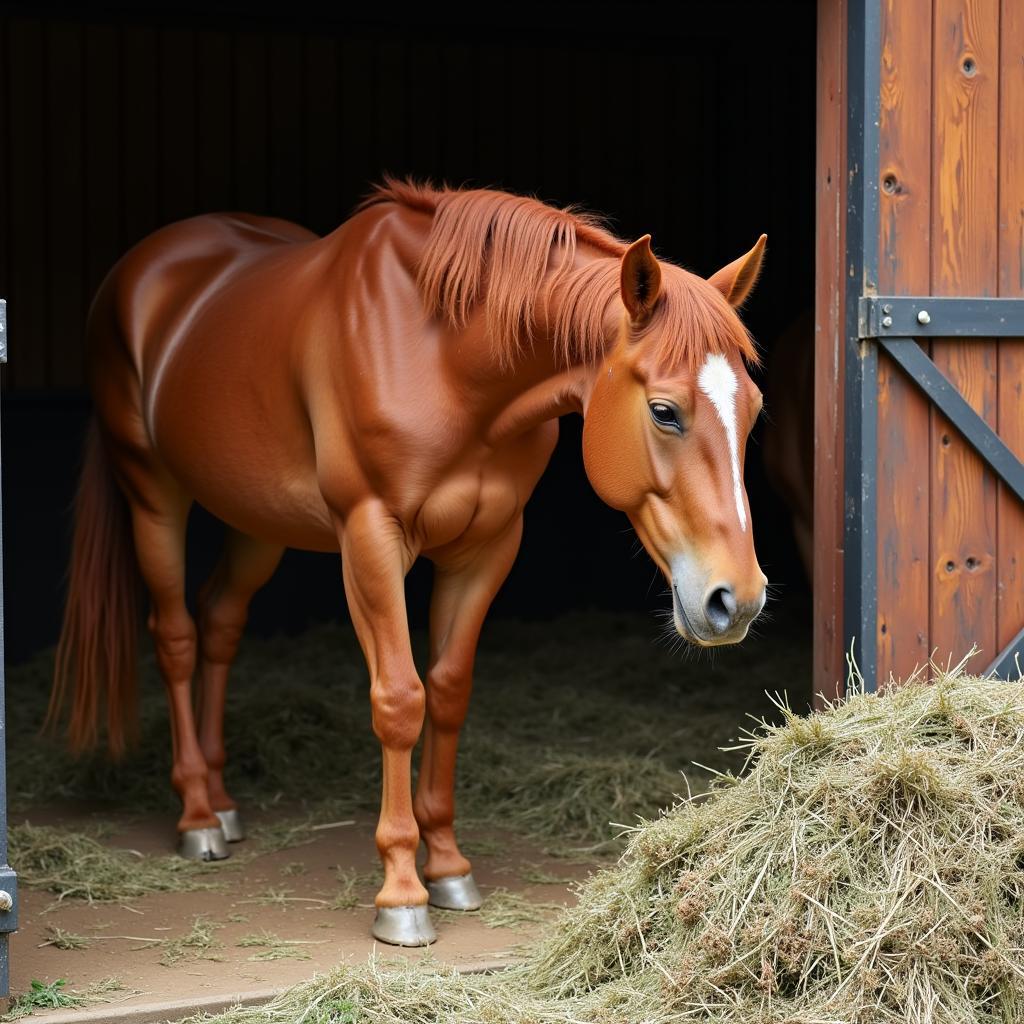Rye hay is a type of forage that is often fed to livestock, but can horses eat it safely? As a horse owner, it’s essential to be knowledgeable about what you can and cannot feed your equine companion. Let’s delve into the details of rye hay and its suitability for horses.
 Horse Eating Hay in Stable
Horse Eating Hay in Stable
Nutritional Value of Rye Hay
Rye hay can be a good source of nutrients for some animals, but it’s not always the best choice for horses. Here’s a breakdown of its nutritional content:
- Protein: Rye hay has a moderate protein content, typically ranging from 8% to 12%.
- Fiber: It’s relatively high in fiber, which is essential for a horse’s digestive health.
- Calcium and Phosphorus: Rye hay generally has lower levels of calcium and phosphorus compared to other types of hay like alfalfa.
While these nutrients seem beneficial, there are some crucial factors to consider before feeding rye hay to your horse.
Potential Risks of Feeding Rye Hay to Horses
While rye hay can be a source of nutrients, it presents several potential risks that horse owners should be aware of:
- High Sugar Content: Rye hay, especially early-cut rye, can be high in sugar. This can be problematic for horses prone to laminitis, a painful hoof condition.
- Ergot Contamination: Rye is susceptible to ergot, a fungus that produces toxins harmful to horses. These toxins can cause various health problems, including neurological issues, reproductive problems, and even gangrene.
- Digestive Upset: The high sugar and starch content in rye hay can disrupt a horse’s digestive system, potentially leading to colic or other gastrointestinal issues.
When Rye Hay Might Be Suitable
While there are risks associated with feeding rye hay to horses, there are a few situations where it might be used cautiously and in moderation:
- Mature Rye Hay: As rye hay matures, the sugar content decreases, making it potentially safer for horses. However, it’s crucial to ensure it’s free from ergot.
- Short-Term Feeding: If other hay options are limited, rye hay can be used for a short period, but careful monitoring for any adverse effects is crucial.
- Horses Without Metabolic Issues: Healthy horses without a history of laminitis or other metabolic conditions might tolerate rye hay in small amounts. However, it’s always best to err on the side of caution.
Alternatives to Rye Hay for Horses
Safer and more suitable hay options for horses include:
- Timothy Hay: Known for its low sugar and calorie content, making it ideal for many horses, especially those prone to laminitis.
- Orchard Grass Hay: Another excellent choice with moderate nutritional value, suitable for most healthy horses.
- Alfalfa Hay: Higher in protein and calories, making it suitable for growing horses, pregnant or lactating mares, and those with higher energy needs.
Tips for Feeding Rye Hay Safely
If you choose to feed rye hay to your horse, it’s crucial to do so with caution. Here are some tips:
- Source Carefully: Purchase rye hay from a reputable supplier who can provide information about its sugar content and ensure it’s free from ergot contamination.
- Inspect Thoroughly: Before feeding, visually inspect the hay for any signs of mold, dust, or discoloration, which could indicate ergot or other problems.
- Introduce Gradually: Start by feeding small amounts of rye hay mixed with other safe forages, gradually increasing the amount over time while monitoring your horse closely for any adverse reactions.
When in Doubt, Consult Your Veterinarian
The best resource for determining if rye hay is appropriate for your horse is your veterinarian. They can assess your horse’s individual needs, health history, and risk factors to provide personalized recommendations.
Conclusion
While rye hay might seem like a readily available forage option, it’s essential to proceed with caution when considering it for your horse. The potential risks associated with its high sugar content and ergot contamination make it a less-than-ideal choice compared to safer alternatives. Prioritizing your horse’s well-being by making informed decisions about their diet is paramount. If you’re unsure about incorporating rye hay into your horse’s feeding program, consulting your veterinarian is always the best course of action.
FAQs
1. Can horses eat rye grass hay?
Ryegrass hay is different from rye hay. Ryegrass hay, particularly perennial ryegrass, can be a suitable forage for horses when managed properly for low sugar content.
2. What are the signs of ergot poisoning in horses?
Signs of ergot poisoning in horses can vary but may include neurological issues such as tremors, incoordination, and seizures. It can also cause reproductive problems and gangrene.
3. What type of hay is best for horses with laminitis?
Horses with laminitis need low-sugar hay options like timothy hay or orchard grass hay. These types of hay are lower in calories and sugar, which is crucial for managing laminitis.
4. Can I feed my horse rye hay if it’s mixed with other types of hay?
Even when mixed with other hays, the potential risks associated with rye hay remain. It’s best to avoid feeding rye hay altogether to minimize any potential health concerns.
5. How much hay should I feed my horse?
The amount of hay a horse needs varies depending on factors like age, activity level, and metabolism. As a general rule of thumb, horses should consume around 1.5% to 2.5% of their body weight in forage per day.
Need More Help?
Do you have more questions about your horse’s diet or other equine care concerns? Justus Horses USA is here to support you every step of the way. Contact our expert team today for personalized advice and guidance.
Call us at: 0772127271
Email us at: [email protected]
Visit us at: QGM2+WX2, Vị Trung, Vị Thuỷ, Hậu Giang, Việt Nam
Our dedicated customer care team is available 24/7 to assist you with all your equine needs!